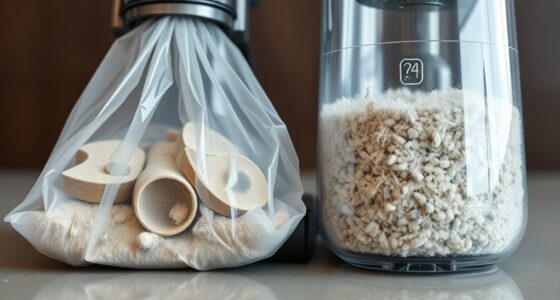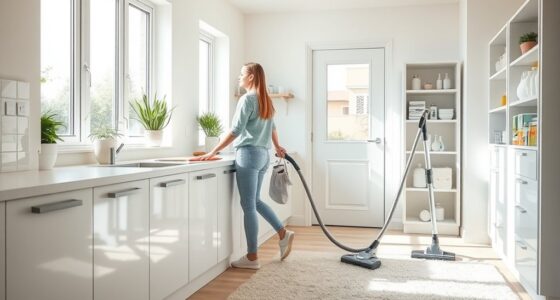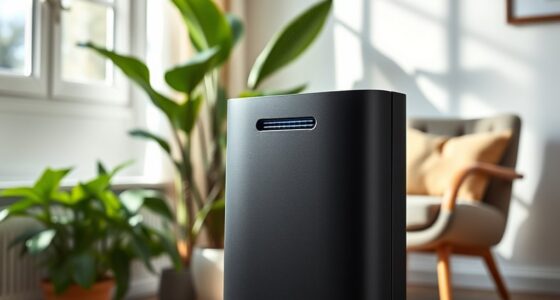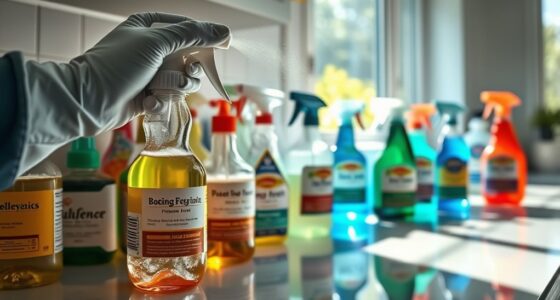If you need hospital-grade air purification, ULPA filters are your best choice since they trap 99.999% of tiny particles down to 0.12 microns, including bacteria and viruses. HEPA filters still provide excellent filtration for dust, pollen, and many microorganisms, making them suitable for most homes and offices. Understanding the differences helps you pick the right system, so if you want to find out more about their suitability for your environment, keep exploring.
Key Takeaways
- ULPA filters offer hospital-grade purification by trapping 99.999% of particles down to 0.12 microns, including bacteria and viruses.
- HEPA filters effectively improve air quality for homes and offices, capturing 99.97% of particles as small as 0.3 microns.
- Choosing between HEPA and ULPA depends on the required level of cleanliness, with ULPA suited for strict environments like hospitals.
- ULPA filters are more costly and require more power and maintenance compared to HEPA filters.
- Proper filter maintenance is essential to ensure optimal performance and air safety in both filter types.
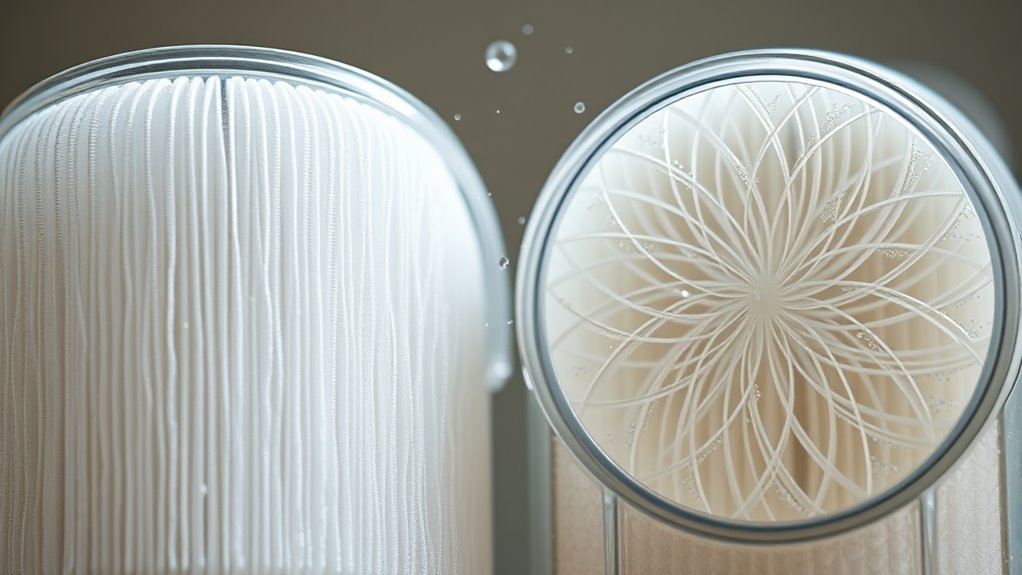
When choosing air filtration systems, understanding the differences between HEPA and ULPA filters is vital. Your decision impacts air quality greatly, especially if you need a system capable of removing tiny particles with high efficiency. HEPA filters are well-known for their ability to trap 99.97% of particles as small as 0.3 microns, making them a popular choice for homes, offices, and healthcare environments. They effectively improve indoor air quality by capturing dust, pollen, pet dander, and some airborne microorganisms. However, their capacity to filter out ultra-fine particles is limited compared to ULPA filters.
ULPA filters, or Ultra-Low Penetration Air filters, take filtration a step further. They can trap 99.999% of particles down to 0.12 microns, which includes most bacteria, viruses, and other microscopic contaminants. If your priority is hospital-grade air purification—such as in medical facilities, laboratories, or cleanrooms—ULPA filters are often necessary. They provide a higher level of contamination control, but they also demand more from your system regarding power, maintenance, and cost.
Choosing between HEPA and ULPA involves evaluating your specific needs. For general air quality improvement in a typical home or office, a HEPA filter usually suffices. It strikes a good balance between filtration efficiency and ease of filter maintenance. HEPA filters are generally easier to replace and maintain, with many units designed for straightforward filter swaps. Regular maintenance is key to maintain peak filtration performance. Over time, filters can become clogged with captured particles, reducing airflow and decreasing effectiveness. Neglecting filter maintenance can lead to diminished air quality and increased energy consumption as your system works harder to circulate air.
In environments requiring the highest level of cleanliness and infection control, ULPA filters are worth the extra effort. They typically require more frequent inspections and replacements, and their heavier build can demand specialized equipment or more powerful fans to function properly. If you opt for ULPA filters, you’ll need to stay on top of filter maintenance to ensure they continue performing at peak levels, maintaining the air quality standards you need. Overall, your choice hinges on your specific air quality goals, budget, and willingness to perform routine maintenance. Whether you select HEPA or ULPA, understanding the importance of filter maintenance will help you keep your air clean and safe over time. Additionally, proper filter maintenance is crucial to maximize the lifespan and efficiency of your filtration system.
Frequently Asked Questions
How Long Do HEPA and ULPA Filters Typically Last?
You might wonder how long HEPA and ULPA filters last. Typically, filter replacement intervals depend on environmental factors like airflow, usage, and contamination levels. HEPA filters usually need replacement every 6 to 12 months, while ULPA filters last around 1 to 2 years. Regular inspections help guarantee superior performance, so keep an eye on filter condition and replace them promptly based on manufacturer recommendations and environmental conditions.
Can HEPA Filters Remove Viruses Effectively?
You wonder if HEPA filters can remove viruses effectively. They do, especially with proper airflow optimization and filter compatibility. HEPA filters trap particles as small as 0.3 microns, including most viruses, making them reliable for cleaner air. To maximize their efficiency, guarantee your system maintains consistent airflow and uses filters compatible with your unit. Regular replacement also helps keep viruses and other contaminants out of your environment.
Are ULPA Filters Suitable for Residential Use?
Think of ULPA filters as the superheroes of air purification—capable of catching even the tiniest particles. While they’re highly effective for maintaining excellent air quality and filtration efficiency, they’re usually overkill for residential use. ULPA filters are designed for critical environments like cleanrooms, not for everyday homes. For most households, high-quality HEPA filters provide sufficient purification without the complexity or cost of ULPA systems.
What Maintenance Is Required for HEPA and ULPA Filters?
When it comes to air filter installation, you’ll need to follow a regular filter replacement schedule to keep your filters functioning effectively. HEPA and ULPA filters typically require replacement every 6 to 12 months, depending on usage and air quality. Be sure to inspect your filters regularly, clean or replace them as needed, and consult manufacturer guidelines for specific maintenance instructions to guarantee ideal purification performance.
How Do Filter Costs Compare Over Their Lifespan?
Imagine a clear stream flowing steadily, symbolizing your air quality. As you consider filter costs over their lifespan, remember that initial prices differ—ULPA filters tend to be more expensive upfront. However, their higher efficiency means they may save you money long-term by maintaining superior air quality. While ULPA filters cost more initially, their durability and performance can balance out expenses, ensuring you get effective filtration without frequent replacements.
Conclusion
Choosing between HEPA and ULPA filters is like picking the right brush for a masterpiece—you need the right tool for the job. HEPA filters excel at capturing most airborne particles, making them great for general purification. But if you need hospital-grade purity, ULPA filters are the heavy-duty guardians in the fight against microscopic threats. Think of ULPA as your shield in the battle for a safer, cleaner environment—because when it comes to air quality, every detail counts.


